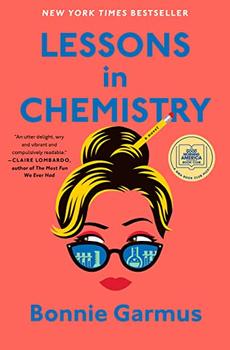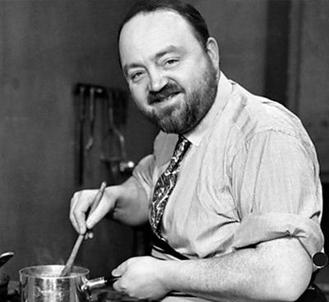Summary | Excerpt | Reading Guide | Reviews | Beyond the Book | Read-Alikes | Genres & Themes | Author Bio

 Book Reviewed by:
Book Reviewed by:
Kim Kovacs
Buy This Book
This article relates to Lessons in Chemistry
 In Lessons In Chemistry, the main character is the reluctant host of a popular TV cooking show.
In Lessons In Chemistry, the main character is the reluctant host of a popular TV cooking show.
Gordon Ramsay, Bobby Flay and Rachael Ray are just a few of the many modern TV chefs who’ve become household names. Cooking shows are now not only daytime television staples; they're featured in the primetime lineup. Such was not always the case.
The first cooking shows were produced for the radio. Dr. Édouard de Pomiane, a French food scientist and writer, hosted what's likely the first, starting in 1923. His weekly program on Radio Paris featured stories about his experiences in the kitchen as well as recipes for home cooks.
U.S. advertisers soon took notice of the program's popularity. In 1921, food manufacturer General Mills had created a fictional homemaker named Betty Crocker to represent their brand, and in 1924 they gave Betty her own radio program, The Betty Crocker Cooking School of the Air. The show, first hosted by Agnes White, debuted in Minneapolis and proved so popular it was picked up by the NBC network and aired nationally. Betty was joined in 1926 by Aunt Sammy, the make-believe wife of the equally fictitious Uncle Sam. Invented by the U.S. Department of Agriculture, Aunt Sammy dispensed cooking, canning and gardening advice to Depression-era housewives.
The first televised show dedicated to cooking was a BBC production hosted by well-known British chef Philip Harben. The program premiered in 1946, when WWII rationing was still in place, and Harben frequently showed how best to cook with food in short supply (he sometimes used his own rations in his demonstrations). Across the pond, the first American chef to hit the airwaves was James Beard, whose I Love To Eat was broadcast nationally later that same year. The 15-minute weekly show was initially sponsored by the Borden Company. A year later, it was purchased by Birds Eye Frozen Food and expanded to 30 minutes, but only ran another month after the sale before it was canceled; the viewership wasn’t large enough for its corporate sponsors to make a profit.
The person many consider to be TV's first true superstar chef was Julia Child, who, much like Lessons in Chemistry's Elizabeth Zott, had a vastly different career before turning to cooking (she once worked as an OSS spy). After graduating from Paris's Cordon Bleu chef's school, she co-wrote the 1961 work Mastering the Art of French Cooking, which was designed to make French cuisine and techniques accessible to American home cooks. While promoting her book, she was a guest on a book review show on Boston's PBS station, WGBH, where, according to the station's archives, "She arrived with a hot plate, giant whisk, and eggs and made an omelette on the set." Child was an instant sensation; dozens of viewers wrote the station asking for more. Her show, The French Chef, premiered on February 11, 1963, and ran for the next 10 years. "Audiences fell in love with her wavering voice, fondness for wine and butter, eagerness to hack away with a knife, and customary closing phrase, 'Bon appétit'." She hosted nearly 200 live episodes and won Peabody and Emmy awards for her work.
The cooking show became an American TV staple in the 1960s through the 1990s, with popular chefs such as Joyce Chen, Graham Kerr ("The Galloping Gourmet"), Delia Smith and Martha Stewart hosting programs over the years. The genre’s popularity, however, exploded in 1993 with the launch of The Food Network, a cable channel devoted entirely to food and cooking. By 2013, some 99 million households subscribed to the station. The network has since expanded beyond basic instructional shows to cooking competition programs, those that showcase specific restaurants or cuisines, and demonstrations of how food is grown or processed, among many other related topics.
Another revolution in popular cooking is underway today, as people turn to social media, podcasts, and other sites such as YouTube for cooking demonstrations, ideas and inspiration. For more on the history of celebrity chefs, check out our article on The Rise of the Celebrity Chef.
Photo: Philip Harben
Filed under Cultural Curiosities
![]() This article relates to Lessons in Chemistry.
It first ran in the December 7, 2022
issue of BookBrowse Recommends.
This article relates to Lessons in Chemistry.
It first ran in the December 7, 2022
issue of BookBrowse Recommends.




Censorship, like charity, should begin at home: but unlike charity, it should end there.
Click Here to find out who said this, as well as discovering other famous literary quotes!
Your guide toexceptional books
BookBrowse seeks out and recommends the best in contemporary fiction and nonfiction—books that not only engage and entertain but also deepen our understanding of ourselves and the world around us.